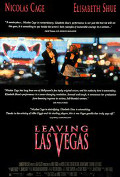
Directed by
Mike Figgis
112 minutes
Rated R
Reviewed by
Bernard Hemingway

Leaving Las Vegas
In form Leaving Las Vegas is a conventional Hollywood romance yet its incongruous content concerns two people bonded by self-abuse one of whom we are watching effectively committing suicide. If the inversion of the form is a puzzlement, the attempt to portray the confusion of the soul misses its mark precisely because of the formulaic nature of the film.
Whether or not Nicolas Cage, who took home an Oscar for his at tie\mes cartoon-like sad-sack performance as the self-destructive drunkard, Ben, gives an accurate portrayal of the horrors of alcoholism I do not know but for my money Ray Milland did it so much more convincingly in the Billy Wilder classic, The Lost Weekend (1945). But perhaps Milland also had a better film behind him. Credibility really is the issue here. It is hard to accept that a balding, badly-dressed drunk (Cage) would, with barely an eyelid being batted, pique the interest of a $300 hooker (Elisabeth Shue). The film also requires us to overlook the disparity between the peaches-and-cream good looks of a Hollywood A-list actress and the realities of street prostitution, Shue's character, Sera, is not so much a tart with heart as a trick-turning Mother Teresa to naughty little Ben who's got one powerful liking for the bottle.
Although we do not get the back-story to these characters' problems, and Cage in particular has got a mighty big one (perhaps a failed marriage), just in case we need help to understand the story, the film uses the device of inserting a cleaned-up, post main narrative Sera talking to some off-camera person to explain the significance of what we see which is even further embellished by a kind of vocal commentary in the form of Sting's intrusive jazz-imbued warblings. Vastly over-rated, Leaving Las Vegas is one of those films that presents the seamy side of life palatably enough for a mainstream audience to feel they have taken a walk on the wild side but without putting their comfort zone at risk. For those interested a thematically-comparable film, Barbet Schroeder's Barfly (1987) is a somewhat more satisfying film.
FYI: Authenticity may not be the film's strong point but it certainly underpins the story. John O'Brien, the author of the book upon which the film is based, shot himself in the head shortly after production began.
Want something different?





